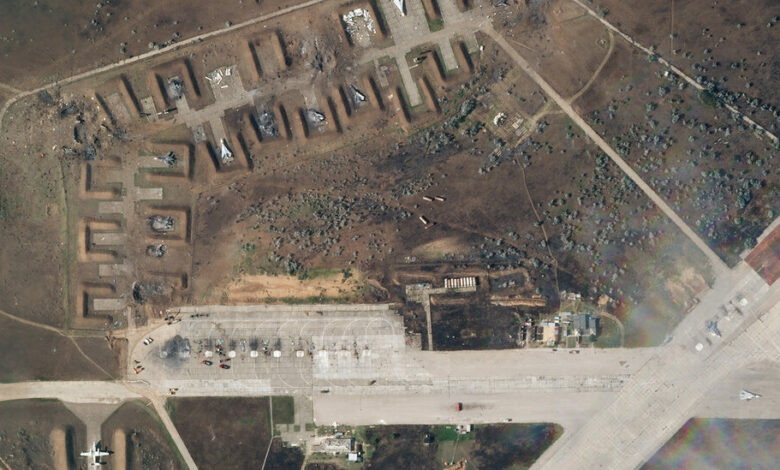Your Thursday Briefing


A satellite image showed significant damage at Saki Air Base in Crimea.Credit…Planet Labs
Satellite images show damage from Crimea blast
Satellite photos taken after a series of explosions on Tuesday at a Russian air base in Crimea appear to show at least three blast craters and at least eight wrecked warplanes, indicating a serious blow to the Russian military contradicting the Kremlin’s account. Russian authorities had previously denied that any aircraft had been destroyed.
A senior Ukrainian official has said the blasts were an attack carried out with the help of partisans but was not more specific. Military analysts have said that Ukraine does not have missiles that can reach the base from territory it controls, well over 100 miles away, and that Ukrainian jets would have been unlikely to penetrate that far into Russian-controlled airspace.
Witnesses reported multiple explosions at the Saki base. Officials said at least one person was killed and more than a dozen wounded. Sergei Aksyonov, the Kremlin-installed leader of Crimea, said that at least 62 apartment buildings and 20 commercial structures had been damaged. He declared a state of emergency and raised the terrorism threat level on the peninsula.
Background: Russia has heavily militarized Crimea since seizing it from Ukraine in 2014 and has used the peninsula as a vital jumping-off point for military operations since the broader invasion of Ukraine on Feb. 24. Even so, the attack on the air base suggests that Ukrainian forces are able to carry out guerrilla operations there.
In other news from the war:
-
Russian missiles killed at least 13 civilians near a Russian-held nuclear plant in southern Ukraine, a Ukrainian official said.
-
Hungary’s main oil conglomerate said it would pay a bill owed by Russia’s oil pipeline operator to the Ukrainian authorities, clearing the way for Russian oil deliveries to resume to three Central European countries.
-
Months after Russian soldiers withdrew from Bucha, the Kyiv suburb’s residents have begun to bury their unidentified dead.
Trump declines to answer questions under oath
Days after his home was searched by the F.B.I. in an unrelated investigation, Donald Trump invoked his constitutional right against self-incrimination while being questioned under oath by the New York State attorney general, Letitia James. The former president responded to every question posed by her investigators by repeating the phrase “same answer.”
Trump’s refusal to respond substantively could determine the course of the three-year civil investigation into whether the former president fraudulently inflated the value of his assets to secure loans and other benefits. He has long dismissed the inquiry but was compelled to sit for questioning under oath after multiple judges ruled against him this spring.
His only detailed comment, people with knowledge of the proceeding said, was an all-out attack on the attorney general and her inquiry, which he called a continuation of “the greatest witch hunt in the history of our country.” Reading from a prepared statement, he said that he was being targeted by lawyers, prosecutors and the news media.
Next steps: James is now left with a crucial decision: whether to sue Trump or seek a settlement that could extract a significant financial penalty. And while declining to answer questions might have offered the safest route for the former president, it could strengthen the attorney general’s hand in the weeks to come.
A U.N. agency’s oil and gas partners
A $1.9 million regional aid package unveiled by the United Nations Development Program on the edge of the Colombian Amazon is one example of how one of the world’s largest sustainable development organizations teams up with polluters, even those that at times work against the interests of the communities the agency is supposed to help.
A Times investigation found that U.N. partnerships with oil companies have led to the agency’s acting in the interests of those firms. In the program in the Amazon, the U.N. agency paired with GeoPark, a multinational petroleum company that holds contracts to drill near and potentially on the ancestral land of Indigenous Colombians like the Siona people.
These partnerships are part of a strategy that treats oil companies not as environmental villains but as major employers that can bring electricity to far-flung areas and economic growth to poor and middle-income nations. The development agency has used oil money to provide clean water and job training to areas that might otherwise be neglected.
Response: The development agency said it supports a clean energy transition and does not encourage drilling. But Achim Steiner, the agency head, said that its mission was to bring people out of poverty and often entailed working in countries built on fossil fuels. “We have to start where economies are today,” he said. “I don’t see a contradiction, but there is a tension.”
THE LATEST NEWS
Around the World
-
In response to Chinese military drills around Taiwan, the U.S. said it would continue operating in the Taiwan Strait.
-
Children in London under 9 should be offered a booster dose of polio vaccine, health authorities said, after traces of the virus turned up in sewage samples.
-
A beluga whale that had been stranded in the Seine river about 40 miles from Paris died after a last-ditch rescue operation.
-
The U.S. returned 30 looted cultural artifacts to Cambodia this week.
Other Big Stories
-
Inflation in the U.S. slowed in July, in part because the costs of fuel and airfare fell. Rent and food continued to get more expensive.
-
The U.S. Justice Department charged a member of Iran’s Islamic Revolutionary Guards Corps with plotting to kill John Bolton, Donald Trump’s national security adviser.
-
The families of the Israeli athletes killed by terrorists at the 1972 Munich Olympics intend to boycott a memorial ceremony planned in Germany because of a dispute over compensation.
What Else Is Happening
-
FIFA is seeking a schedule change to let Qatar, the host nation, play in the first match of the World Cup.
-
Scientists discovered compelling evidence of a world just 1.5 million years old, making it one of the youngest planets ever found — if not the youngest.
-
Canadians are flocking to see Serena Williams play after she announced her upcoming retirement from tennis.
-
Have you ever seen a sea sponge sneeze?
A Morning Read
The black Issey Miyake turtleneck favored by Steve Jobs was not by any means the Japanese designer’s most interesting garment. It may even have been his most banal. But the turtleneck embodied Miyake’s founding principles and served as the door through which even those not particularly interested in fashion could enter the Miyake universe.
ARTS AND IDEAS
Memorializing those lost to Covid-19
Monuments have long commemorated the loss of life from calamitous events: wars, genocides, terrorist attacks.
But Covid-19 poses a unique challenge. Millions of people have died, but not in a singular event or in a single location. Now, as the death toll continues to rise, communities are building new monuments and expanding existing ones, trying to keep up with their mounting grief.
In Malaysia, photographs and biographies of victims are updated online. White ribbons flutter on a church fence in South Africa, and white flags dot the National Mall in Washington. In London, family members and friends have written the names of their dead on a wall alongside the River Thames, above.
“We really do need to remember, and we need to do it now,” said Erika Doss, a researcher at the University of Notre Dame. “Covid isn’t over. These are kind of odd memorials in that names are being added. They are kind of fluid. They are timeless.”
PLAY, WATCH, EAT
What to Cook
For a bit of spark, add pomegranate molasses, sumac and toasted walnuts to this tomato salad.
What to Watch
The “Game of Thrones” prequel is coming.
What to Read
Set on a fictional Hawaiian island during the pandemic’s dark early days, Elizabeth Hand’s “Hokuloa Road” brims with menace.
Now Time to Play
Here’s today’s Mini Crossword, and a clue: The “S” of GPS: Abbr. (three letters).
And here’s today’s Wordle and the Spelling Bee.
You can find all our puzzles here.
That’s it for today’s briefing. Thanks for joining me. — Natasha
P.S. The Times won a Pulitzer last year for its Covid coverage. The pandemic kept the medal from going on display at the Times Building — until now.
The latest episode of “The Daily” is about the F.B.I. search of Mar-a-Lago.
You can reach Natasha and the team at [email protected].



